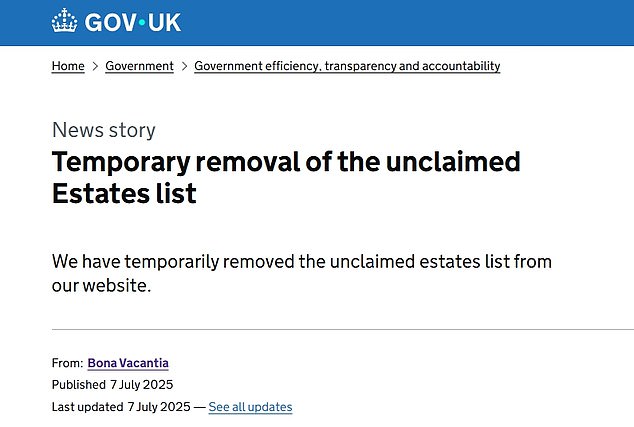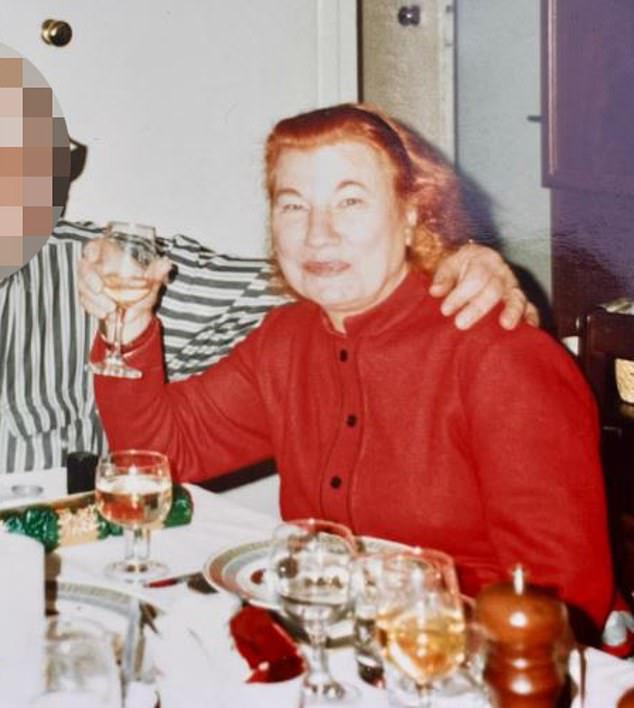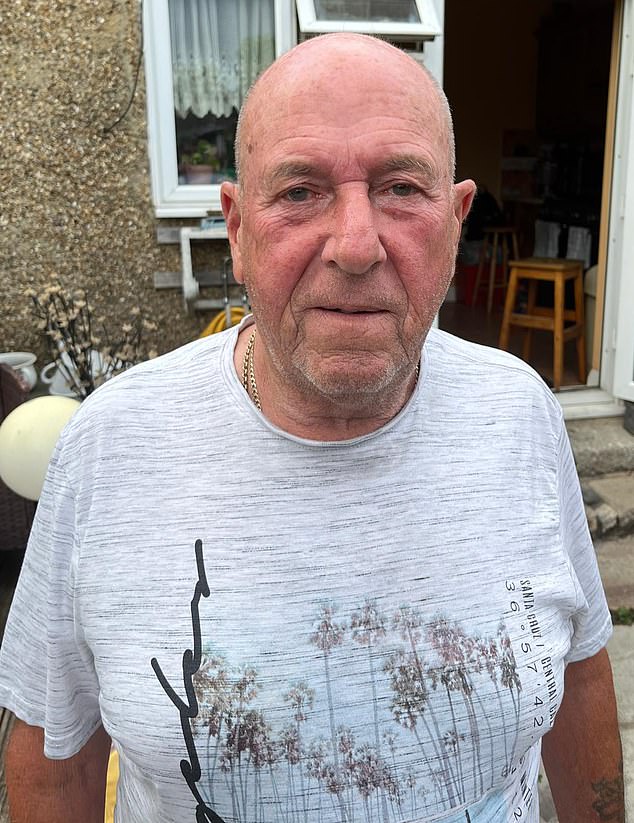Around £1.6billion of estates is going unclaimed after the Government pulled a website listing individuals who did not make a will, experts have said.
The ‘bona vacantia’ list – Latin for ‘ownerless goods’ – was used by people to check if distant relatives had unclaimed property and other assets for which there was no immediately apparent heir.
However, a BBC investigation revealed that it was being used by criminal gangs to commit fraud by posing as the sole heir to unclaimed fortunes – depriving living relatives of their rightful inheritance.
It published the results in a podcast called The Grave Robbers – and a day after the series was released, the Treasury yanked the list from public view. It is unclear when it will be published again.
UK law firm Weightmans suggested the net worth of Britain’s unclaimed estates was around £1.6billion, based on the approximately 6,000 outstanding fortunes that were unclaimed at the time, and a then-average property price of £281,000.
The public nature of the list kick-started a small industry of ‘heir-hunting’ – legitimate research of the list to marry up estates with their rightful heirs, who they will contact to alert them to the find and offer to administer the will in exchange for a fee.
It sparked the BBC TV series ‘Heir Hunters’, which was presented by Nadia Sawalha, Lisa Faulkner and Michael Buerk, which followed the work of the firms as they tried to trace relatives who did not know they were in line for a windfall.
But it also made them a lucrative target for organised crime gangs who were able to falsify wills, forging the signatures of the dead in order to steal their fortunes.
Have you been a victim of estate fraudsters? Email: jon.brady@mailonline.co.uk

The Government removed the ‘bona vacantia’ list of unclaimed estates a day after a BBC investigation revealed it was being abused by organised criminals

Sisters Lisa and Nicole discovered they were entitled to their late aunt Christine Harverson’s home in London

Eileen Holland, a 90-year-old retired teacher and former Liberal Democrat council candidate, had her home claimed and turned into a cannabis farm
There are concerns that the withdrawal of the list will mean families lose out on fortunes that they never knew they were entitled to – even as the Government says the withdrawal was necessary to safeguard the unclaimed fortunes detailed.
Hector Birchwood, of Welsh heir-hunting firm Celtic Research, told the Telegraph: ‘It’s a knee-jerk reaction that doesn’t actually address the problem – it only makes it worse.’
The scam saw gangsters use the list to look up estates vulnerable to a hostile takeover. They would then apply for a ‘grant of probate’ – the legal right to administer a will – online. Critics say the system is too open to exploitation.
The BBC probe found that a Hungarian gang was exploiting loopholes in the system to claim forgotten estates – and creating civil nightmares for family members who are alerted to the fraud.
Families would only become aware of distant relatives’ estates after being alerted by heir-hunters – and then would find that a person they had never heard of had staked a claim to an often large fortune.
Among them was Christine Harverson, whose nieces Lisa and Nicole were alerted to their aunt’s neer-£1m fortune by a heir-hunting service – only to find a Hungarian man called Tamas Szvercsok had claimed it, saying he was her ‘dear friend’.
But the sisters, and Ms Harverson’s friends, were suspicious as the late woman had never mentioned a Hungarian friend. Other details didn’t match up – including an address that didn’t exist until 2021, when the will was dated 2016.
A MailOnline investigation then found that the west London home of former Liberal Democrat councillor had passed into the possession of a Romanian man, Aurel Mezei, who posed online with large knives.
Eileen Holland’s home was later raided by police who found it had been turned into a cannabis farm. The will bore signatures of witnesses who did not know of either Mezei or Holland. Mezei then sold the house for £375,000.
Jeff Barnes, 64, is one of her few surviving relatives: she was his great-aunt.

Aurel Mezei – a heavily tattooed 44-year-old from the northern Romanian city of Baia Mare, inherited Eileen Holland’s home

Her home was later re-painted and the back garden resurfaced. Police later raided it and found a cannabis farm being run from the property

Jeff Barnes, 64, from Enfield, is one of Mrs Holland’s few surviving relatives. She was his great-aunt
‘I think this needs investigating a lot further,’ he told MailOnline. ‘It seems obvious to me that this is a scam, and that this so-called businessman got the house illegally.
‘It’s disgusting that he’s been able to get away with it. He’s wormed his way in, and I worry that slippery characters like this – who may or may not even still be in the country – often succeed in evading detection.’
However, those who have found lost relations thanks to the bona vacantia list say it needs to be returned to service as soon as possible to help others like them.
Jason Cao, whose sister Huong Lan Cao died a recluse, told the Telegraph that he would never have known she had passed away were it not for heir-hunters like Hector Birchwood.
‘To be able to tell my mum – so she could have closure – that’s information I would have paid for. If it hadn’t been for Hector, my mum would still be asking, ‘Where’s your sister?’ And I wouldn’t have an answer.’
The Government says that while it appreciates the issues caused by the withdrawal of the list, the fraud investigation needed to be allowed to proceed unobstructed.
In some cases, the BBC found, fraudsters were using wills to stake their claims on properties that the deceased person did not even own – with the Probate Service failing to check that the will was correct.
It is thought they do this to try to stake a claim for other buildings when their actual owners also pass away.
Sir Bob Neill, former chair of the House of Commons Justice Select Committee, believes the push to digitise Probate Service applications – moving away from regional offices – has driven a rise in fraudulent claims.
The current system was rolled out in 2017 – overwriting the old system, which required applicants to visit their local probate office in order to swear an oath that they had a legitimate claim to the estate.
‘When you had regional offices you had human awareness, contact and scrutiny that was better suited to pick up cases where things have gone wrong,’ he said.
‘A purely sort of automated system isn’t really good at doing that.’
Estates that are unclaimed for 30 years become the property of the Crown. The Crown Estate made £67million from unclaimed estates in 2024/25, down from £77million the year before.
A Ministry of Justice spokesman said: ‘We recognise the difficulties the website’s removal causes for those affected but this is an important measure while a fraud investigation is underway.
‘Probate fraud is incredibly serious, and it is vital that we work with the relevant agencies to support ongoing investigations into alleged fraudulent activity to ensure criminals feel the full force of the law.’
The Government Legal Department told MailOnline today that it could not provide an estimate as to when the list may go live again.
